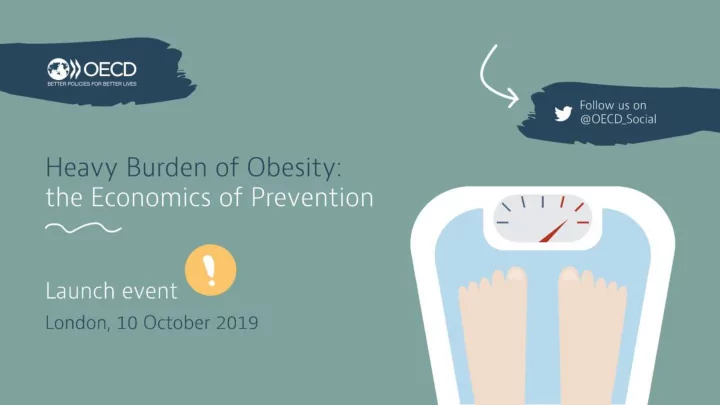

THE HEAVY BURDEN OF OBESITY THE ECONOMIC OF PREVENTION Michele Cecchini OECD – Health Division
Almost two in three persons living in the United Kingdom have overweight. Nearly one in three has obesity
Unhealthy Diets and Lack of Physical Activity Underpin the Rise in Overweight in the UK 70% 3 in 4 Individuals do not of people have an consume a sufficient unhealthy diet amount of fruit and (measured against national vegetables guidelines) 1 in 3 28% individuals does not of people spend more do a sufficient amount than 7 hrs/day in of physical activity sedentary activities (e.g. sitting) Source: OECD analyses on National Health Surveys and National Time Use surveys
Obesity Carries a Significant Economic Burden For The UK And Other OECD, EU28 and G20 Countries Percentage of healthcare expenditure spent on Reduction in GDP due to overweight and related overweight and related conditions conditions FRA JPN JPN FRA POL ITA GBR ESP 8.4% DEU OECD average 8.4% SWE AUS AUS ITA OECD average SWE 3.3% GBR 3.4% ESP CAN CAN POL DEU USA USA 0% 1% 2% 3% 4% 5% 0% 3% 6% 9% 12% 15% Note: All figures are annual average over 2020-2050; source: OECD SPHeP NCD model
Overweight And Its Associated NCDs Carry Significant Personal Costs Equivalent tax increase per capita due to overweight (GBP) Boys with obesity are 58% less likely to have USA IRL completed higher GBR education at age 29 by SWE JPN DEU CAN 650 GBP/capita AUS FRA ESP ITA Reduced labour force productivity OECD average CHE due to unemployment, sick leaves, KOR early retirement and reduced NLD productivity because of overweight 1000 0 200 400 600 800 1000
OECD Countries Have a Comprehensive Set of Policies to Tackle Obesity, But Gaps Remain • Policies are too often National dietary guidelines implemented in forms that are Adult obesity strategy not the most effective Childhood obesity strategy • Limited resources or practical National PA guidelines problems limit the number of individuals that would Mandatory nutrition std in potentially benefit from the school policy compuls voluntary TV advertising restriction • The environment is still too SSBs food Health-related food taxes much obesogenic and conducive Mandatory F-o-P labelling to unhealthy lifestyles 0% 25% 50% 75% 100%
Public Health Actions to Promote a Healthy Lifestyle Health education and health Environmental changes Regulation promotion Promotion of physical activity in Regulation of advertising of unhealthy Food labelling schemes schools food to children Workplace wellness programmes Menu labelling schemes Workplace sedentary behaviour Mass media campaigns programmes Increase in access to active public Prescription of physical activity by transport primary care doctors Mobile apps to promote healthier lifestyles Food reformulation
Public Health Actions to Promote a Healthy Lifestyle Health education and health Environmental changes Regulation promotion Promotion of physical activity in Regulation of advertising of unhealthy Food labelling schemes schools food to children Workplace wellness programmes Menu labelling schemes Workplace sedentary behaviour Mass media campaigns programmes Increase in access to active public Prescription of physical activity by transport primary care doctors Mobile apps to promote healthier lifestyles Food reformulation Mixed Physical activity Communication package package package
Tackling Obesity Keeps Healthy, Decreases Healthcare Expenditure and Increases Labour Force Productivity Disease cases avoided Health expenditure saved Additional available labour (number of cases) (USD PPP) force (full-time workers) … Physical activity 20,147 15,759 906 81,643 package 1,686 4,008 Mixed package 1,221 94,421 34,987 18,927 2,729 3,363 Communicatio 40,539 27,249 1,346 134,346 ns package 5,101 0 20,000 40,000 60,000 80,000 0 500 1,000 1,500 0 50,000 100,000 150,000 Millions CVDs Diabetes Dementia Cancers Note: all figures are annual average over 2020-2050, total for 36 countries. Source: OECD SPHeP NCD model
Preventing Overweight Is a Good Investment for OECD Countries Return on investment USD returned in GDP for every 1 USD invested in the intervention 6 5 4 3 2 1 for 1 1 return 0 Note: Annual weighted average over 2020-2050, total for 31 countries. Source: OECD SPHeP NCD model & OECD ECO long term forecast model
In the UK, A 20% Reduction in Calorie Content In High Calorie Food Has a Significant Effect 211 Mil 19,500 GBP saved every year Cases of NCDs avoided due to reduced per year, including healthcare expenditure 12,500 CVDs 0.15% 25,000 Increase in Gross additional full-time Domestic Product workers per year due to (GDP) increased productivity Note: annual average over 2020-2050 Source: OECD SPHeP NCD model & OECD ECO long term forecast model
Policy Implications • Overweight keeps increasing due to unhealthy diet, lack of physical activity and sedentary behaviours • Overweight has enormous (and rising) negative health, economic and social effects on the society and on single individuals • Much has been done but even more needs to be done: we need to strengthen policies currently in place and close policy gaps in certain areas • Policy packages to promote a healthier diet and an active lifestyle, particularly those modifying the environment, are an excellent investment; reformulation may play a significant role
The Heavy Burden of Obesity – The Economics of Prevention is Out! Contact us: Michele.Cecchini@oecd.org Francesca.Colombo@oecd.org Data, country notes and much more at: oe.cd/obesity2019 Follow us: @OECD_social
Recommend
More recommend